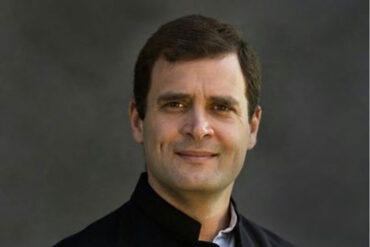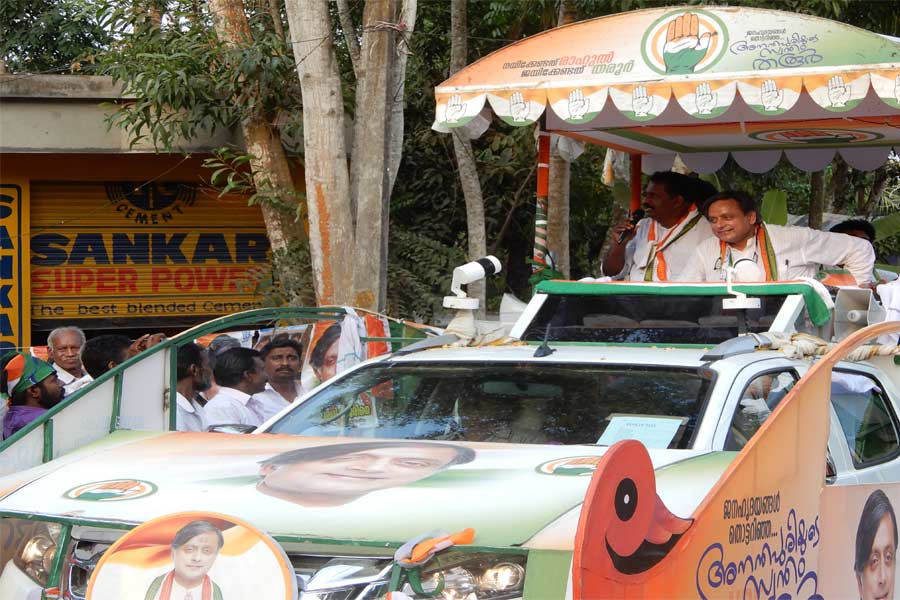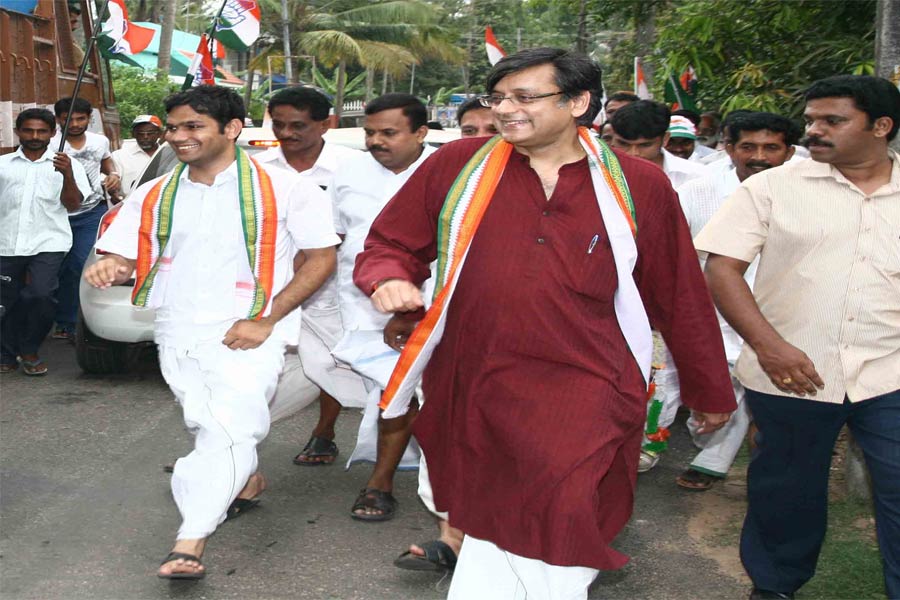In February, I was in Thiruvananthapuram for nearly a week for personal and work-related stuff. My last port of call was writer Paul Zacharia’s apartment on a Sunday evening. When I called him at short notice and requested for an audience, Zacharia initially tried to shake me off—only to finally agree to talk to me for 30 minutes. He was busy giving final touches to his now released debut English fiction—A secret history of compassion. My freewheeling conversation with the writer ended with some political chatter. And I asked him the inevitable: Which candidate was he supporting in the general elections as a voter enrolled in Thiruvananthapuram?
Pat came the reply, “Shashi Tharoor”.
Was he worried about the prospects of the BJP candidate winning if the secular votes are divided? I persisted.
“No. Because Tharoor is a good people’s representative”
Now, Zacharia doesn’t hide his Left leanings. And he seemed upset with the way the Congress and the United Democratic Front (UDF) capitulated to public opinion even as Chief Minister Pinarayi Vijayan took a strong position on implementing the apex court order on Sabarimala. Still, he was backing Tharoor.
Later, Zacharia wrote a Facebook Post in support of Tharoor for which he would cop abuse and criticism from the Communist Party of India (Marxist) and its proxies like fellow writer N S Madhavan.
Shashi Tharoor had begun preparations for the campaign well in advance before the BJP named their best bet in Kummanam Rajasekharan and the Communist Party of India nominated veteran C Divakaran. Tharoor’s campaign had been progressing steadily when Malayala Manorama came up with a survey giving a slight edge to Rajasekharan in the first week of April.
One of the key findings of the survey was how Sabarimala was a bigger issue for voters of Thiruvananthapuram compared to other constituencies with 34% respondents saying the issue would affect their voting choices. Tharoor had gauged the sentiments of the electorate much earlier like the consummate politician he has become and had taken a tactical position on the issue, very much like his party colleagues.
A few days before the Manorama survey was published, K Muraleedharan was announced as the Congress candidate from Vadakara to take on P Jayarajan. Muraleedharan’s presence in Thiruvananthapuram was important to Tharoor for Muraleedharan is a stalwart politician who would have ensured there was no internal sabotage.
In the weeks following the Manorama Survey, news channels like Mathrubhumi and Asianet came up with their opinion polls which now pegged the difference in vote share between Tharoor and Rajasekharan at 7 per cent and 6 per cent respectively, with both surveys putting Rajasekharan’s vote share in the range of 40-41 per cent and Tharoor at 33-34 per cent. C Divakaran was nowhere in the picture with his vote share plummeting to 23-25 per cent in the surveys.
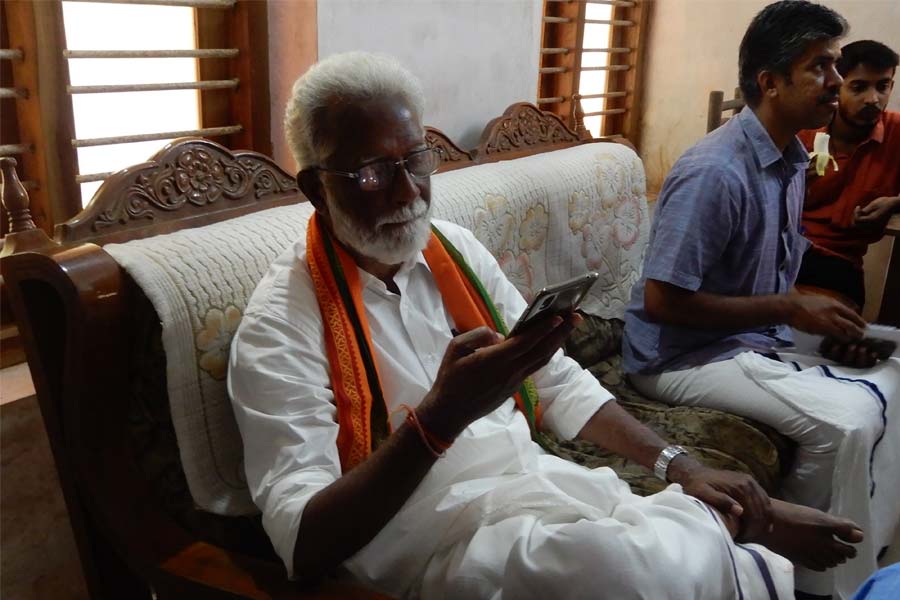
The Kochi Post set out to gauge the mood and spent a couple of days in the capital city. Most people whom we asked randomly said they would vote for the BJP. Things were vastly different in the interiors and coastal areas but it was clear to us how the opinion polls had reached such a conclusion as any random show of hands or unscientific poll in a tea shop favoured the BJP. The Sangh Parivar was clearly doing all they could and their on-ground campaigning was unmatched by rival fronts. Kummanam Rajasekharan’s win seemed a foregone conclusion to many.
The BJP affiliates pulled out every trick in the book by misquoting lines from Tharoor’s 1989 fiction–The Great Indian Novel—to portray him as someone who showed his own community (Nair) in poor light for merely writing about a historical fact pertaining to the community. This was supposed to damage his prospects in Thiruvananthapuram, with a high concentration of Hindus (67 per cent against the state average of 55 per cent) and Nairs making up a sizeable number.
The Left wasn’t throwing in the towel yet as they latched on to the “squeamishly vegetarian” comment of Tharoor on Twitter and distorted it to paint him as a caste Hindu with a Savarna mentality. The idea was to eat into the Latin/Nadar/Fisherfolk vote bank of Tharoor which propelled him to victory in 2014 despite trailing in 4 out of the 7 assembly segments. Tharoor immediately sensed the danger and had to pose with a picture of him holding a giant fish aloft as part of damage control.
Meanwhile, in the Congress camp, the Mathrubhumi opinion poll released on April 8 and the Asianet poll released on April 14 created panic as many local Congress leaders were also simultaneously found to be missing in action. It seemed that some Congress leaders were sabotaging the campaign from within.
In 2014, Thiruvananthapuram MLA V S Sivakumar’s brother had burned the effigy of Tharoor and the needle of suspicion was pointed at him. Sivakumar, as the leader of the Chennithala faction in the district and Thampanoor Ravi, as the leader of the Chandy faction, had the onus of putting up a united front with DCC President Neyyanttinkara Sanal but were found to be wanting. Many Congress workers and local leaders had also migrated to the adjoining Attingal constituency where Adoor Prakash was taking on A Sampath with huge resources at his command.
One could clearly notice the tension and worry creases on Tharoor’s face as the BJP campaign seemed to get ahead of his. A frantic SOS was sent to the All India Congress Committee (AICC) from Tharoor’s camp for intervention from the party High Command. Rahul Gandhi came to Thiruvananthapuram to address a rally on April 16 as scheduled but a request for Priyanka Gandhi to visit the constituency was turned down.
Many senior leaders including A K Antony joined the campaign and it seemed Tharoor had managed to swing back into a position of strength by the end. In fact, Tharoor camp exuded confidence albeit with caution after the poll. The massive turnout, especially in the coastal areas, was interpreted in multiple ways but Congress was expecting to win by a margin of at least 25000 votes. In the end, Tharoor nearly matched his 2009 margin of one lakh votes and secured a thumping win.
So, what were the factors that helped Tharoor win against all odds?
The consolidation of secular vote behind Tharoor proved to be a critical factor. When opinion polls gave 6-7 per cent lead to Kummanam, and with C Divakaran completely out of the picture, many swing voters who alternate between the LDF and the UDF based on the mood and prevailing issues seem to have stood behind Tharoor to stop the BJP from opening its account. Tharoor’s win is a huge validation of the Left psyche of Kerala.
The Congress voters are generally less vocal than either the Left voters or the BJP voters and this also probably explains why the opinion polls got it so wrong. Was there any cross-voting by the Left as the BJP has alleged post the results? It is very unlikely and the bogey of cross-voting is an oft-resorted fantasy of the Marxists conveniently used to mislead minority voters. The Left votes have consistently been on the decline in Thiruvananthapuram of late and if C Divakaran still polled 25 per cent votes, it was the Left’s core vote.
Yes, the BJP was expecting to win Thiruvananthapuram but it was premised on the possible impact of Sabarimala which Tharoor had effectively neutralized. The BJP could not match its performance in 2014 despite pulling out all the stops and a “golden opportunity”. Tharoor’s tactical position on Sabarimala made a difference.
Tharoor, the self-professed liberal, wrote an Op-Ed in The Print back in November saying how the liberal in him was torn as a people’s representative due to his personal convictions conflating with the sentiments of the people he represented in Parliament. Later, he wrote a follow-up Op-Ed elaborating why he cannot support the blanket entry of menstruating women in Sabarimala against prevailing customs prompting this writer to pen a rejoinder to Tharoor in the same publication.
But Tharoor knew better how going against public opinion would be suicidal in his predominantly Hindu constituency. This tactical stand proved to be critical in Tharoor’s re-election and preventing erosion of votes to the BJP.
When The Kochi Post caught up with Tharoor in the middle of the campaign, he explained his stand on Sabarimala thus:
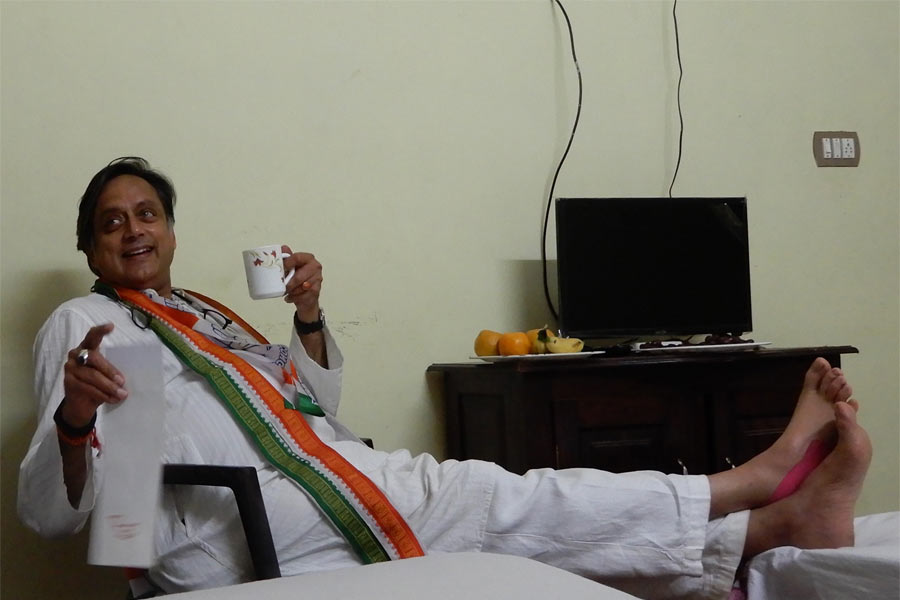
“We are taking the Sabarimala issue head-on because we actually believe the BJP has pulled a con on the voters by claiming they stood with the believers. It is a naked lie that they stood with the believers. There are only two things that they could have done to ease the pain of the believers. One is to get the Supreme Court to revise its verdict by submitting a review petition. The Congress did so but the BJP did not. The second is to bring a law—neither had they done that. I raised a question in the winter session of Parliament on December 19. I asked if they will bring a law on Sabarimala. They said they will look into the matter and reply. Then, during the Budget session, I got up on the floor of the House and asked the question again but still I got no answer. They didn’t bring an ordinance either. All the options available to them to address the unhappiness of the believers were not utilised. All they did was bring bedlam for their own political advantage. They stood by themselves not by the believers. One weak answer Kummanam Rajasekharan gave was that they cannot do anything because the matter is sub judice. That is incorrect because the Supreme Court verdict on the SC/STs was also similar but the BJP ignored that and brought a constitutional amendment and passed it. In the case of Sabarimala, they didn’t see any political advantage in doing anything similar other than converting a sacred place, a shrine, into a stage for political drama. In the process they get their faces on TV every day. As a result, they managed to convince the innocent voter that the BJP stood by them. The only party that brought a review petition and raised a question in Parliament is the Congress or the UDF—not the BJP. The entire campaign in Thiruvananthapuram is a tissue of lies”
It is also important to factor in the women voters of Thiruvananthapuram in this context. While the Sabarimala issue saw many women hitting the streets at the exhortation of the Nair Service Society (NSS) for prayer processions, it is unlikely that they would have switched to the BJP in Thiruvananthapuram. For instance, The Kochi Post often came across many angry men in Thiruvananthapuram venting their anger on the issue of Sabarimala but the women were conspicuously less vocal. The women as a constituency seem to have largely stuck to Tharoor.
In hindsight, the BJP probably missed a trick in not fielding someone almost equally popular with women, like a Suresh Gopi, who managed to give rival fronts a scare in Trissur with a late surge. Trissur has many similarities with Thiruvananthapuram and Kummanam Rajasekharan’s lack of charisma might have been a factor in his loss. Rajasekharan’s campaign was largely based on trying to connect with voters and his speeches were kept short and non-provocative in a bid to shake off his Hindutva image of the past. In comparison, O Rajagopal, the BJP candidate in 2014, enjoyed a moderate image.
The new voters and the youth in general seem to have backed Tharoor going by the numbers. So did the coastal belt despite the slander tactics adopted by the Left and the social engineering attempts of the BJP. A BJP leader in Thiruvananthapuram told this writer how they had paid huge sums of money to the representatives of a Church with little strength in the constituency in a bid to maximise their numbers. But none of it seems to have worked with the community as the Latin/Nadar/Fisherfolk overwhelmingly voted for Tharoor.
Finally, the good performance of Tharoor as a Member of Parliament as Paul Zacharia himself endorsed was a big factor. Apart from becoming a more consummate (read expedient) politician adept at reading the pulse of the people, Tharoor has served the people of Thiruvananthapuram well and this election is a vindication of that.
With inputs from Minu Ittyipe





